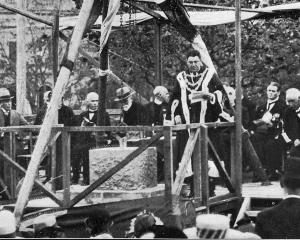
The buildings and grounds were gay with bunting and with banners bearing devices of welcome, and groups of flags strung high across the green signalled the words ‘‘fifty years”. Visitors as they arrived were cordially greeted by the president (Mr C. Fraser) and Mrs Fraser. Neat souvenir illustrated booklets outlining the history of the club were freely distributed, and many present wore the handsome souvenir badge in the club’s colours. Among those specially invited were representatives of the Dominion Bowling Council, of the Dunedin Centre, and of sister clubs and past members. Bowling in South Otago was well represented among the visitors. A specially prepared autograph album was kept busy among the visitors all the afternoon, and is to be preserved among the club’s treasures as a valuable memento of the occasion.
Sallies’ appeal at Herbert
On Friday evening last a party from Palmerston visited Herbert to assist Captain Sutherland of the Herbert Corps of the Salvation Army with her annual self-denial appeal. Mr Donald Sutherland, who was the organiser and chairman, had arranged for private cars to convey the party to Herbert, where tea awaited them on their arrival. The Public Hall was packed in the evening, with an audience assembled from miles around. Captain Armstrong of Palmerston opened the proceedings with a prayer and introduced Mr Sutherland, who stated that some of the best talent in Palmerston, representative of all the different denominations, had come along most willingly to assist the Salvation Army.
After a lengthy entertainment programme, a Dutch auction of superior gifts was held.
Gabriel’s pioneer dies
Our obituary columns this morning record the death of Captain Samuel Hatfield, formerly of Dunedin. Born in Kent and educated at Bluecoat School in London, Captain Hatfield served as a midshipman aboard a tea clipper trading to China. He arrived in New Zealand about 1862, and was one of the first men in the Gabriels Gully gold rush. He was for many years engaged in trading to the Chatham Islands, and on one occasion he narrowly escaped capture by the Maori chief Te Kooti at the Chathams. After retiring from the sea he went to Ohakune, being one of the first settlers there, and continued farming right up to the time of his death. He is survived by two sons, three daughters and 19 grandchildren.
Rats leaving ships
When the steamer Canberra was examined on arrival at Melbourne recently about 100 rats were caught, but they were all healthy. This is not regarded as a very large number for a vessel of this size (says the Argus).
Some time ago the Federal officers caught 1100 rats on an overseas vessel, which had not been fumigated for several years.
- ODT, 3.10,1921.












